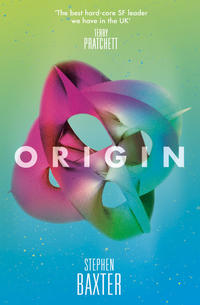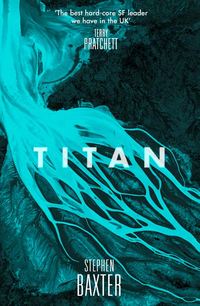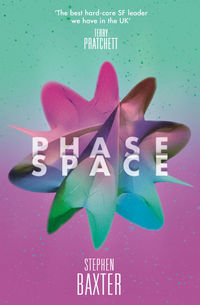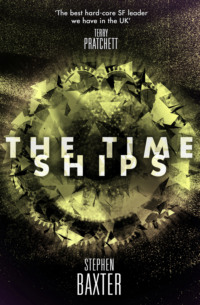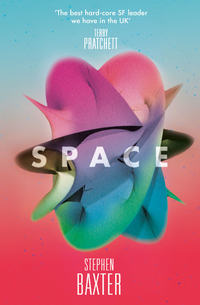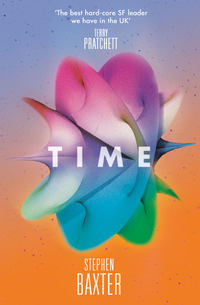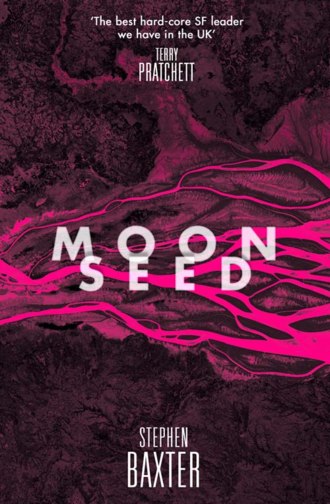
Полная версия
Moonseed
He knew he wouldn’t mention what he’d seen to Tom.
On impulse, he leaned over, scooped up another fragment of the bedrock sample, stuffed it inside a sample bag and crammed it into a pocket on his leg.
Then, his bedrock under his arm, he snapped shut his sun visor and clambered back up the slope, towards Tom and the waiting Rover.
After a four-billion-year wait, the visit with its burst of activity had lasted only three days, the final flurry of dust settling after only seconds.
At Aristarchus Base, Rover tracks and footprints converged on the truncated base of the abandoned Lunar Module. The blast of the departed ascent stage’s engine had left a new ray system, streaks of dust which overlaid the footprints.
Now the Moon was inert once more, the sculpted hills of the Aristarchus ejecta blanket rising above this puddle of pitted, frozen basalt, their slopes bathed in sunlight, shining like fresh snow.
Waiting.
In places, the disturbed dust stirred. Glowed softly silver.
II ARD TOR
I
Geena Bourne woke up before dawn. She was, of course, alone in the apartment.
She got up in the dark and walked around putting on lights.
Henry had gone.
Fled. But he’d taken nothing. No furniture, no carpets or curtains, no CDs or books, not even his own clothes. Nothing but his geology hammer, as far as she could see.
Oh, and Rocky, their labrador, the Rock Hound.
Shit.
It was worse than if he’d taken everything, or trashed the place.
Still, she knew where he’d be. She pulled a coat over her pyjamas, got in the car and drove out, through the night, to the USGS.
It was cold. Always cold, here in the mountains.
The Cascades Observatory of the United States Geological Survey was a squat, unimposing two-storey building, a slab of cinder-block. In the harsh, incomplete glow of its security lights it looked sinister, like some prison block transported from Soviet Russia.
She had a little trouble with the guards. Lady, it’s 3 a.m. Do you know what time it is? 3 a.m. … But her NASA pass and a little sweet-talking got her inside.
And here was Henry, tucked up on top of a sleeping bag he’d spread out on the floor of his cramped office. The clutter of his work lay everywhere: geological maps and structure charts, trays of samples, microscope slides with slivers of rock, electronic parts, his precious polarizing microscope inside its grimy, worn-smooth wooden box. And Henry himself in the middle of it all, as sound asleep as if he were out on a field expedition in the Kalahari, his long, thin body folded over, his heavy black hair falling around his face.
Rocky was here, lying on a blanket in a crate in the corner. The mutt came forward, licked her hand regretfully, and went back to the crate and fell asleep.
She prodded Henry’s kidney with her toe, reasonably gently. ‘Hey. Crocodile Dundee. Wake up.’
He came awake, with an ease she’d always envied.
‘It’s you.’ He rolled over and sat up.
‘Of course it’s me.’
‘I left, Geena. It’s over.’
‘Do you have any coffee in here?’
He ran his hand over his stubble and yawned. ‘No,’ he said. ‘Go away and leave me alone.’
‘Believe me,’ she snapped back, ‘there’s nothing I’d like better. But I can’t just walk away.’
‘Why not?’
‘Because we have things to talk about.’
‘Geena, my lunar probes just got canned. My career is stiffed. What things?’
‘Our assets, Henry. Our property.’
‘All there is, is stuff. Burn it. I don’t care. Sell the apartment. It was no use anyhow, since we both spent the last two years working out of Houston.’
She said heavily, ‘We’re taking apart our home.’
He closed his eyes.
‘I know.’
‘Then you can’t just walk away. You have to go through the pain, Henry …’
There was a light in the window.
Maybe it was the torch beam of some security guy, Geena thought, distracted. Rocky whined a little, and padded over to the window. Whatever the light was, it was high up; it cast Rocky’s shadow on the floor behind him.
Not a torch beam, then.
Even as she tried to deal with this situation with Henry, her damn problem-solving brain kept working. Something in the sky. A chopper beam, maybe a police patrol? But the beam would shift. And there’d be noise. The Moon, then? But the light was the wrong quality, vaguely yellow-white. And besides, the Moon was near new tonight.
The dog was staring up at the light as if he’d seen a ghost.
She said, ‘What about the dog?’
‘He comes with me. He’s my dog. He predates you.’
‘I suppose he does. But he’s used to staying with my mother –’
Henry unfolded off the floor and stretched, tall and wiry, strong hands flexing. His face was dark in the uncertain light from the window, weather-beaten by all those days in the field. He looked towards the yellow glow at the window. ‘What the hell’s that?’
‘I thought it was a chopper. But it isn’t.’
‘No.’
They walked towards the dog, still standing in his shaft of light, Henry’s bare feet padding on the tiled floor.
‘… Jesus,’ he said.
‘What is it?’
Henry was standing over the dog, staring up into the anomalous light. She came to stand beside him.
The light, beaming in through the window, was so bright it was glaring, dazzling, like a spotlight in the face. But she could see it was a point source.
It was fixed in the sky. There was no noise, no rotor clutter.
The light was eerie. Not part of the natural order. This is bad news, she felt instinctively.
‘What do you think?’ he said. ‘A planet?’
‘Too bright.’
‘A satellite?’
‘Not moving quickly enough.’
‘A star, then,’ he said. ‘It would have to be a nova. Or a supernova.’ He frowned. ‘I don’t like it.’
‘In case it’s a supernova?’
‘Even if not. It shouldn’t be there.’ He glanced at her. ‘Don’t you feel it?’
‘Yes,’ she said reluctantly. ‘I guess I do.’ Bad news. ‘What would a supernova do to Earth?’
He shrugged. ‘Depends how close. Supernovas are candidates for causing extinction events in the past. The radiation burst, the heavy particles … A massive star exploding within a hundred light years might give the planet a dose of five hundred roentgens.’
‘Enough to kill.’
‘Oh, yes. Even the trees. Did you know that? Trees are about as sensitive to radiation as humans. Also, all that ultraviolet hitting the atmosphere – disassociated nitrogen will oxidize to form nitrous oxide, which will react with the ozone and deplete it –’
‘Just as well we destroyed the ozone layer already, then,’ she said drily. ‘But maybe it isn’t a supernova.’
She couldn’t identify what part of the sky this lamp hung in. Her astronomy wasn’t so good, considering her career choice. But then it didn’t need to be, if you planned to spend your working life in low Earth orbit. ‘What else could it be?’
He leaned forward, resting his hands on the window ledge, and looked around the sky. ‘I wish they’d clean these windows. Kind of a poor observing platform we have here … Oh.’
‘What?’
‘I think it’s Venus.’
She frowned. ‘Venus, the planet?’
He said heavily, ‘What other Venus? It’s right where Venus is supposed to be, tonight. And I don’t see any bright object nearby that could be Venus. So, it’s Venus.’
‘But how can it suddenly become so bright?’ She remembered an old science fiction story. ‘Oh. Venus is closer to the sun than Earth. What if the sun has flared? Or even gone nova? And the reflected light –’
‘No.’ He shook his head. ‘It’s near superior conjunction right now. Which means it’s on the far side of the sun, so showing us a full face. So if you think about it, by the time the increased sunlight reflected off Venus and crossed space to get here –’
‘The sunlight would have reached us direct, already.’ A suppressed sigh of relief. ‘So Venus itself must have gotten brighter.’
‘Which is impossible.’
‘Is it? Maybe it’s some kind of volcanic thing.’
‘What kind of volcanic thing?’
She was used to his sarcasm. ‘You’re the geologist. Think of something.’
He went to the back of the office, and came back with a scuffed pair of binoculars. He raised them and focused them briskly.
He whistled.
‘What?’
He passed her the binoculars, leaving the strap around his neck, so she had to lean towards him to use them. She scanned around the sky, seeking the glare.
The binoculars resolved the distant, fixed stars to points. The glasses were too weak, she realized, to resolve Venus – on normal nights – to anything better than a minute disc, or crescent, at best.
But this wasn’t a normal night.
Where Venus ought to have been there was a bright, smudged disc, not quite symmetrical.
‘Holy God,’ she said.
‘I think,’ Henry said, ‘that Venus has exploded.’
The call didn’t wake Monica Beus, for the simple reason that she hadn’t been asleep.
‘Yes?’
Monica. It’s me. Alfred.
Alfred Synge: astronomer, colleague, lover back when they and the world were young.
‘Where are you?’
Kitts Peak. The observatory. Have you seen it yet?
‘What?’
Take a look out the window.
She lay for a minute in the stale warmth of her bed. The insomnia was the worst thing, for her, about the diagnosis.
Breast cancer. What the hell kind of thing was that for her to contract? Her breasts had gotten her nothing but unwelcome attention when she was younger; she was of a generation that had been encouraged to use them as little as possible for what they were intended, which was to suckle children; and now some cosmic ray, a random piece of debris from some long-gone supernova explosion, had come whizzing across space in order to zap her just so …
If any of it made sense, it might be acceptable. But it didn’t. If she had no stake in the world – if her son, Garry, and his family, didn’t exist – it might be reasonable. But she did have.
She missed the ability to sleep, though. She longed for the ability to turn off her mind, the constant thinking, like a camera watching the world that never let up.
But sleepless or not she was warm and comfortable here, her aches and pains fooled into silence for a while, and she felt reluctant to climb out into the harshness of the cold, vertical world. And for what?
‘What is it, Alfred? A lunar eclipse? A meteor shower?’ Alfred did get a little carried away with his profession at times. It was enviable, a man whose job was his hobby, his passion. Also a little irritating.
Uncharacteristically, he hesitated. I think you ought to see for yourself.
‘Why?’
You might want to think about waking the President.
Not a lunar eclipse, then.
She got out of bed, and her body set up a chorus of aches. She pulled on a housecoat, picked up the phone handset, and walked to the window.
She pulled back the heavy drapes and looked out over Aspen.
Dawn was coming, she saw, and the leaves of the trademark aspen trees were already glowing with the pearl light, bone white; the quaint street lamps were starting to dim. Another hour or so and the first light of another early spring day would be touching the Rockies.
Beautiful place. She had moved here to be close to her faculty, at the Center for Physics. She suspected she was going to have to move before long, though. She couldn’t see how she could stand to die here, to leave behind so much beauty. Everybody should die someplace ugly, where it wouldn’t matter so much …
On the other hand, maybe it was this beautiful place that was killing her. Up so high, poking out of Earth’s shielding blanket of air, Aspen received twice the sea-level dose of radiation.
There was a new star in the morning sky, bright as a piece of the sun.
It’s Venus, Alfred, on the telephone, was telling her. Venus.
It was casting shadows, long raking shadows, from the aspen tree stands.
The astrologers will be jumping up and down, she thought. We’re only a few years into the new millennium … and now this.
‘Venus? How can it be?’
I’m afraid there’s no doubt. What you’re seeing is reflected light from the sun, with some intrinsic illumination from the planet itself.
‘Reflected light?’
Monica, the atmosphere seems to have – blown off. The planet is surrounded by an expanding sphere of gases and other debris.
‘Debris? You mean rock?’
Yes. Also fusion products. And the intrinsic illumination – Monica, something is happening on the surface, or maybe in deeper layers. Something very energetic.
Alfred had first gotten the call from his night assistant, a graduate student. It was the student’s job to control the big telescope Alfred was working on at Kitts Peak. Alfred, sitting in an office, confirmed whatever target star he wanted, and observations were made with spectroscopes and charged-couple detectors.
Nobody had been watching the planets, at Kitts Peak Observatory. It was just a casual glance out the window by the night assistant that had led to her noticing the change to Venus.
That was the way with modern astronomy, Monica thought wryly. Nobody looked through the big telescopes any more.
We were finishing up for the night. We were actually getting ready to park the telescope and –
‘Tell me what you did.’
The first thing was to get on the IAU nets. The International Astronomy Union, the astronomers’ jungle telegraph. There are ground-based observers working on this all over the planet already, Monica. Also the radio telescopes. I contacted NASA; they’re repositioning some of the satellites, for example the ultraviolet and X-ray and gamma ray observatories. We’re also speaking to the Europeans, Canadians and Japanese. The Space Station astronauts are doing some good work. NASA are sending up high-altitude experiments, by balloon and sounding rocket and aircraft. NASA are responding quickly, in fact.
‘Well, NASA would,’ she said drily. ‘They’re probably putting together a budget proposal for a new Venus probe as we speak.’
If they are you ought to back it, Alfred said. Monica, we don’t have the faintest understanding of what we’re seeing here. Right now Venus is on the far side of the sun. It took around fourteen minutes for the light curve to show up here. Photons, travelling at light speed. A minute later, a cosmic ray shower showed up.
‘Cosmic rays, from Venus?’
You heard right. Very high energy particles. And in about four hours we’re expecting a blast shell to impact the top of Earth’s atmosphere. The lower energy stuff, coming at thirty or forty million miles an hour. Monica, it’s as if a miniature supernova went off in our back yard. Hell, we’re even seeing a neutrino flux.
‘That’s impossible.’
Nevertheless. I’m not anticipating a lot of sleep in the next few days. Monica, that thing is going to be naked-eye visible, even at noon. It’s going to be unmissable.
So the public would wake up to it, to funny lights in the sky. Monica was one of the President’s senior science advisors. How was Monica going to brief her on this? ‘Tell me what to expect.’
The low-energy cosmic rays will be deflected by the Van Allen belts, which will fill up. We have to expect auroras. Spectacular stuff. Alfred sounded excited, as well he might, she mused; it sounded as if he might get priority on this discovery. The higher-energy stuff will make it through to the atmosphere. Crack the air molecules, create showers of secondary particles. We have to expect a significant increase in background radiation.
‘How much? For how long?’
We don’t know, Monica. We’ve never seen anything like this before. There is also the shower of X-ray and gamma rays. We don’t know how strong it will be at its peak. Maybe there will be some immediate deaths. More likely we will see a pulse of internal cancers, skin cancers, cataracts, in the coming months and years. We will have to monitor the food chain.
‘What should the President tell people?’
To take radiation precautions. Get underground if they can; rock and soil is a good shield. The military and politicos ought to get into their nuclear shelters. If they still have them.
‘They have them.’
If the shower persists we’ll have to think about lead-lining our surface buildings. Oh, air travel ought to be curtailed, at least monitored. And we ought to think about bringing the astronauts home from the Space Station.
‘Enough. All right, Alfred. Thanks. I ought to make some calls.’
Yes. Take care, Monica.
‘And you. Keep in touch.’
Oh, I will.
She put down the phone, and tried to think this through.
It was hard to focus on anything outside her own, failing body. As if she was a self-obsessed character in some daytime soap.
But, it seemed, she was still engaged with the world.
Outside, the light of day was gathering, but the ugly wound in the sky that was Venus was barely dimmed.
She put through a call to the White House.
Even after a week the light of new Venus, bright in the blue sky of a Scottish morning, made Jane Dundas shiver.
Anything so far out of the natural order made her shiver.
Or then again, maybe it was just this place. She looked up at the tower block. Its faceless windows reflected Venus a hundred times over, somehow without generating a shred of beauty. She clung a little harder to the hand of Jack, her ten-year-old son, and stepped forward.
Cordley Road was the site of some of Edinburgh’s more notorious blocks of council housing. Even here, at the entrance, the block was intimidating: evidently repainted and fitted with entry-phones, but a leaking overflow had stained the entrance with damp, graffiti was splashed over the hall, and the shrubbery outside, newly planted, was littered with lager cans and cigarette packets.
The irony was the location here should be prized. Cordley Road was less than fifty yards from the perimeter of Holyrood Park, which contained Arthur’s Seat – Ard Tor, the greatest of the extinct volcanoes on which Edinburgh had been built. She could see the Seat now, a lumpy shoulder of rock looming high to the east; just here she was in the shadow of the Salisbury Crags, a cliff-like extrusion of compounded ash from the old eruptions, glaring over the city like the guns of a battleship.
But what went on in the tower blocks here had nothing to do with anything so wonderful as extinct volcanoes.
Billy Macrae was here to let them in. Billy, ten years old, was one of Jack’s friends from school, and brother to Joe, eleven, who was the kid who had been killed in the lift shaft. Billy had a pixie face compressed under a mat of black hair, and he looked like a wee rascal, as her father might have said. But today he looked subdued. No trouble at all, in fact.
Billy led them to his family’s flat, which was, ironically, on the ground floor. The father let them in. Alan Macrae was a tired-looking man who was probably younger than Jane. No sign of a mother, Jane noted.
He waved them to the sofa. The place was sparsely furnished but clean enough, no more than the usual clutter kids created. Macrae offered them tea but Jane declined.
‘We don’t want to keep you.’
‘Aye. I’m sorry we couldn’t have wee Jack to the funeral. We tried to keep it small. Just family.’
‘I understand.’
Macrae made an effort to smile at Jack. ‘Joe used to talk about you.’
‘We played soccer,’ Jack said.
‘Aye. Not in the hall here, I hope.’
‘No.’
Jane nudged her son, and he produced his gift, a little parcel. Billy Macrae came forward and unwrapped it. It was an elephant, carved of black stone.
Jane smiled. ‘Jack chose it himself from my shop. The rock’s basalt. Lava. The youngest rock on the planet. So it’s appropriate.’
Macrae nodded, and put the knick-knack on the shelf over the gas fire. ‘We got a lot of flowers. People put them in the lift. But they get robbed, of course. The council say they will put steel plates on the lift doors to stop the kids breaking in, fat lot of good that is now.’ He eyed Jane. ‘You’re the one who runs that shop in Waverley Market. Rocks and stuff. Crystals.’
‘That’s right.’
He looked at the elephant. ‘I saw it, you know.’
‘What?’
‘I was on the seventh floor, talking to a mate up there. The windows in the lift shaft doors are broken there. So I saw him fall. Terrible crashing and screaming.’
Jane sat silently, and the boys looked at their feet miserably. It sounded as if Macrae was beyond grief, as if he’d told this story a hundred times over already, as if he couldn’t stop telling it; his voice and face were empty of expression.
‘Lift surfing, they call it,’ he said now. ‘Bloody stupid.’
Jane forced a smile. ‘I used to play chicken on the motorway. All kids are stupid, until they learn better.’
Macrae didn’t seem to have heard. ‘They jam open the shaft doors, see, and that stops the lift going down. Then they get on the roof, and they know how to set the engineer’s switch to “test”, so they can control the lift. Joe got his bloody hand caught, and for some reason the lift started going down, and he fell down behind it, in some kind of maintenance shaft. And that’s what I saw. Crashing and screaming. The thing of it was, at the bottom, he looked all right. Except for his mangled hand. Just asleep …’
And so on.
She stayed for a while longer, letting him talk out his grief a little more. Jack was restless, but she made him sit through it. Survival lesson, she thought. Listen and learn.
But it was hard. It seemed a long time before little Billy led them out.
In the yard, they all cast double shadows from sun and Venus, twin stars, and Jane shivered again.
‘It was our Hamish,’ Billy said unexpectedly.
‘What?’
Hamish turned out to be the elder brother of Billy and dead Joe. Eighteen years old. Jane realized, in retrospect, that there had been no sign of Hamish in his father’s flat.
Hamish, it turned out, had led on the others.
‘Hamish used to take stuff up there,’ Billy said.
‘Stuff?’
‘Lager. Ciggies and things. He even had a seat, so he could sit on top of the lift and ride up and down.’ Even now, even after all that had happened, Billy smiled faintly at the bravado and daring of his brother, and Jane realized anew how very, very difficult it was to restrain boys from following the pack, all the way into the jaws of death.
‘But it was Hamish’s fault,’ Billy said.
‘It was?’
‘He saw that planet thing.’ Billy pointed. ‘When it flared up, like. Hamish saw it through a window. That’s why he let go of the doors, and the lift started going, and Joe fell down.’
This boy will have to live with this. ‘Billy, Hamish is really just a kid too. Nobody’s to blame –’
‘Hamish says it’s not his fault. It’s the fault of that.’ And Billy’s small, grubby hand pointed straight at Venus.
… And elsewhere in Edinburgh, a young policewoman called Morag Decker was pulling on her uniform, about to start her tour of duty. She was on attachment to a community policing unit that night, and would be working with drug addicts. Not an assignment she was looking forward to, but a major problem in Edinburgh. When Venus had first flared up it had caused a problem, as the full-Moon types had crawled out from under their rocks to howl at the new light in the sky; and tomorrow the local Emergency Planning Officer was going to brief them on Scottish Office guidelines on radiation poisoning and other stuff … But all that seemed to be fading, like any other nine-day wonder. For tonight her head was full of apprehension, and she tried to comfort herself with thoughts about the video and takeaway Chinese meal and bottle of wine she’d treat herself to tomorrow night, and she scarcely noticed Venus any more …


